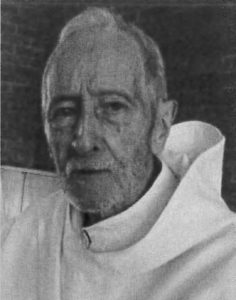 b. 17 February 1927 + d. 7 January 2020
b. 17 February 1927 + d. 7 January 2020
On the morning of 7 January 2020, our beloved confrere Fr. Jesús María Sasía Sopeña died of respiratory arrest at the age of 93 in the 24 Horas Clinic in Flor Amarillo, Carabobo, fortified with the holy sacraments. He had been in this clinic since 2 January. The Funeral Mass was on 8 January at 10:30 a.m. followed by the burial of his mortal remains in the cemetery of the abbey. May he rest in the peace of the Lord!
Fr. Jesús María was born in Portugalete, Vizcaya Province in Spanish Basque Country. His parents were Dionisio and Maria Sofia. He attended p1imary school at the gymnasium of the Augustinian fathers in Portugalete, after which he attended the secondary school in the minor seminary of Comillas, Santander. He entered the Benedictine monastery of Santo Domingo in Silos in 1943 and professed his first vows on 29 April 1945. After the study of philosophy and theology at the abbey itself, he was ordained a priest by Archbishop Pérez Platero, then archbishop of Burgos. In 1953 he was sent to the Benedictine priory of Estíbaliz in the Basque Province of Alava where he remained until he traveled to Venezuela in 1967. After long study and research, he published in Estíbaliz his work Toponimia euzkércia en las Encaraciones de Vizcaya (Bilbao, 1966), (Local Basque Names in the Encartaciones Region of Vizcayaa), fruit of his interest in the Basque language.
In 1967 Fr. Jesús María bade farewell to Estíbaliz and on 30 August came to Venezuela where he joined the community of the Abbey of San José del Avila in Caracas. In Caracas as well as in Camuri Chico and finally in Güigüe,, where the cmmnunity moved at the end of the 80s, he developed a significant role in various areas of community life. He was the prior under Abbot Otto Lohner. Already in Caracas, in the years after the Council and with the liturgical renewal, he undertook to set to music hymns, antiphons, elements of the Liturgy of the Hours and Eucharistic songs. We largely owe to him the hymnal entitled Himnos para la liturgia de las horas (Hymns for the Liturgy of the Hours), a great help for singing which accompanies us today. What should be mentioned is his service to the cmmnunity as organist, which he faithfully performed until a few days before he was admitted to the clinic. We must not forget his important contiibution to the formation of our candidates and his presence in the guest house. For years he introduced our young postulants and novices to the treasury of the liturgy and accompanied our guests with conferences, retreats , opportunity for confession and spiritual direction. If necessary, he also undertook help outside the monastery. He was kind when dealing with the confreres, guests and visitors and at the same time sensitive, prudent and discrete. He studied and liked to read and since our coming to Güigüe was the librarian. His office in the library was one of his favorite places and, if the opportunity arose, he proudly showed guests and visitors the library. He continued to study and research and, together with Fr. Vitalis Friessenegger, he published Nuevas semblanzas benedictinas (Zamora, 1993) (New Benedictine Profiles).
With this short sketch we are far from exhausting the list of the many services and tasks that Fr. Jesus Maria accepted in his long and fruitful life. To mention them all would be going too far. In conclusion, we would like, however, to highlight some of his human and spiritual personality that appears essential to us and that accurately characterized Fr. Jesús María. Fr. Jesús María lived and died as a good monk. In his life as a monk he followed Christ, he identified with his vocation as a monk , lived it in a sincere and authentic way, always in simplicity and in everyday life. An example of stability (he did not like going away from the area of the monastery; and if he did, it was for an impmiant reason), an example of fidelity to the values and requirements of the Rule of St. Benedict. Thus, he made the monastery his home and was a faithful servant, obedient, faithful to the Rule to the end. He moved from the monk’s choir to his cell from his cell to the library office. Thus, he applied himself to prayer, study and the diligent and persistent practice of monastic and community life within the confines of the monastery. We believe and finnly trust that, at his entrance into the house of the Father, Fr. Jesús María heard the encouraging words of the Gospel: “Well done, good and faithful servant! Come, share your master’s joy!” (Mt 25:21).
Güigüe, 10 January 2020
Prior Marco Antonio Gonzalez and the community of San Jose Abbey


